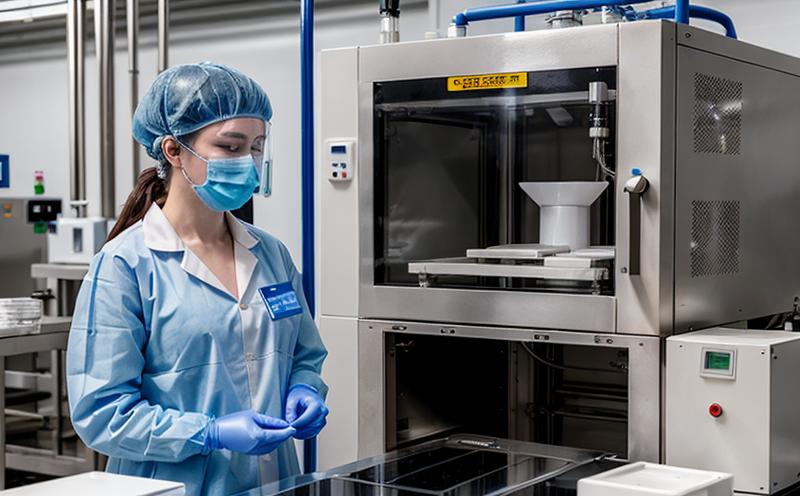GMP Microbial Limit Testing of Water Systems
Good Manufacturing Practice (GMP) compliance is critical in ensuring that pharmaceutical products meet high standards of quality and safety. Microbial limit testing for water systems is a key aspect of this, as it helps ensure the sterility and purity of water used throughout manufacturing processes. This service plays a crucial role in safeguarding public health by preventing contamination from microorganisms such as bacteria, fungi, or viruses.
The process involves collecting samples from various points within the water system and analyzing them for the presence of viable microorganisms. The testing must adhere to stringent standards set forth by regulatory bodies like the FDA and other national health authorities. Compliance with these regulations not only protects public safety but also ensures that manufacturers meet legal requirements.
Water used in pharmaceutical manufacturing can come from multiple sources, including municipal supplies or on-site production plants. Regardless of the source, it must undergo rigorous testing to ensure its suitability for use. This includes testing for total coliform bacteria, faecal coliforms, and other indicators that might suggest contamination. By conducting these tests regularly, companies can identify potential issues early, allowing them to address them before they impact product quality or safety.
The importance of this service extends beyond mere compliance; it also contributes significantly to the overall efficiency of production processes. A well-executed microbial limit test ensures that water systems remain free from contaminants, thereby minimizing downtime due to contamination incidents and reducing waste associated with reprocessing batches.
In summary, GMP microbial limit testing for water systems is an essential component of maintaining high standards in pharmaceutical manufacturing. It helps ensure product safety by identifying and eliminating potential sources of contamination early in the production process. Through regular and thorough testing, companies can uphold their commitment to producing safe medications while also complying with strict regulatory guidelines.
- Quality Assurance: Ensures that water systems meet stringent microbial limits as specified by GMP regulations.
- Purity: Guarantees that the water used in manufacturing processes is free from harmful microorganisms.
Industry Applications
The application of GMP microbial limit testing for water systems spans across several areas within pharmaceutical production. Here are some key sectors where this service finds relevance:
- Powder Production: Ensures that raw materials used in the formulation phase are free from contaminants.
- Tablet Manufacturing: Guarantees the cleanliness of water used during compression processes.
- Bottling and Packaging: Helps maintain hygiene standards throughout packaging operations to prevent cross-contamination.
- Liquid Dosage Forms: Ensures that liquid medications are free from microbial contamination before they reach consumers.
By incorporating this testing into their quality assurance protocols, pharmaceutical companies can ensure the integrity of their products at every stage of production. This not only enhances product safety but also builds trust with regulatory bodies and consumers alike.
Quality and Reliability Assurance
The reliability and accuracy of GMP microbial limit testing are paramount in maintaining the integrity of pharmaceutical products. Here’s how this service contributes to quality assurance:
- Sensitivity: The ability to detect even trace amounts of microorganisms ensures that no contamination goes unnoticed.
- Specificity: Each test is designed to identify specific types of bacteria, fungi, or viruses relevant to the industry.
- Rapid Results: Timely analysis allows for immediate corrective actions if any issues are detected.
The testing process typically involves several steps: sample collection from different points in the water system, culturing samples under controlled conditions, and finally, quantitative analysis using advanced microbiological methods. These methods may include agar plate counts, membrane filtration techniques, or more sophisticated molecular diagnostics depending on the type of microorganism being targeted.
The results are then compared against established limits specified by GMP guidelines to determine whether the water meets acceptable standards for use in pharmaceutical manufacturing. Any deviations from these limits prompt further investigation and corrective measures as necessary.
International Acceptance and Recognition
GMP microbial limit testing of water systems is widely recognized and accepted across international borders due to its consistent application of rigorous standards. This ensures that regardless of location, the same level of scrutiny applies to ensure product safety:
- American Society for Testing and Materials (ASTM): ASTM E1220-18 outlines procedures for determining microbial limits in water used in pharmaceutical production.
- International Organization for Standardization (ISO): ISO 3696 specifies microbiological methods for the examination of water, which is frequently referenced globally.
These international standards provide a uniform framework that helps maintain consistency and reliability across different jurisdictions. Compliance with these standards not only facilitates easier exportation but also builds confidence among regulatory bodies worldwide.
The widespread acceptance of this service underscores its importance in maintaining global pharmaceutical quality standards. By adhering to internationally recognized protocols, companies can ensure their products meet high safety standards regardless of where they are manufactured or sold.





